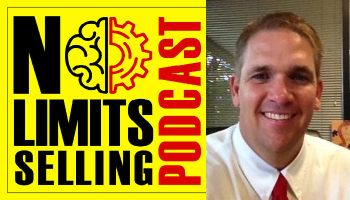How to Unlock Successful Sales and Leadership Strategies
On Episode 226 of The No Limits Selling Podcast, we have Josh Johnsen, Chief Revenue Officer at AdvancedMD. Experienced Executive Vice President Of Sales with a demonstrated history of working in the computer software industry. Strong sales were professional skilled in Negotiation, ADP Payroll, Coaching, Enterprise Software, and Sales.
In this episode, Josh shares with us how to unlock successful sales and leadership strategies.

Contact Josh:
[EDITOR’S NOTE: This podcast is sponsored by No Limits Selling. It is a fun, fast-paced podcast that delivers hard-fought business advice that you can implement today to improve your sales and performance]
Interested In Our Real Estate Coaching Services? Explore Our Website: Link
Feeling Not Well Today? You Can Use Our Mindset Boosters App To amp Up Your Mood: Link
Find us on Social Media:
LinkedIn | Facebook community | Instagram
Like what do you listen to? Subscribe to our podcast!
Ready to become fearless? We can help you become fearless in 60 days so you accomplish more in your career Schedule A 15 min Call with Umar
Summary
Introduction and Background
The podcast begins with host Umar Hameed introducing the show and his guest, Josh Johnsen, the Chief Revenue Officer at AdvancedMD. Umar shares some personal experiences, including the release of his new app, Mindset Boosters, and his travels over the past year. Josh briefly discusses his travels and the importance of understanding different cultures.
About AdvancedMD
Josh provides an overview of AdvancedMD, a cloud-based technology that assists independent physician practices with billing and clinical operations. The company has been around for over 25 years and helps nearly 60,000 physicians nationwide.
Overcoming Technological Resistance
Josh discusses the initial resistance they faced from physicians when introducing cloud-based technology. Overcoming this was one of Josh's successful methods of sales and leadership strategies. Over time, physicians began to adopt the technology, and it became an easier sell. The focus shifted to ensuring physicians get paid and enabling them to do their job without worrying about back-office tasks.
Impact of COVID-19
Josh talks about the impact of COVID-19 on healthcare and how it led to the adoption of telemedicine. He mentions that AdvancedMD had been working on a telemedicine product before the pandemic, which became increasingly relevant as the healthcare industry had to adapt to new ways of providing care.
Sales Team Structure and Recruitment
Josh shares insights into the structure of the AdvancedMD sales team, which includes 110 quarter-carrying sales reps and about 170 people in the entire sales organization. He emphasizes the importance of developing sales and leadership strategies, defining the company culture, and looking for candidates who align with that culture during recruitment. He also discusses the importance of onboarding and retention, with a focus on growing together as a team.
Importance of Sales and Leadership Strategies
Josh talks about the importance of maintaining the company culture by setting a strong base for sales and leadership strategies as the organization grows. He mentions the use of employee net promoter score (eNPS) surveys to gauge employee engagement and identify areas for improvement. He also discusses the various training programs and initiatives in place to keep the sales team at peak performance.
Personal Growth and Balance
Josh shares his philosophy of balance, which involves focusing on faith, family, career, personal exercise, and sports. He emphasizes the importance of giving each aspect the attention it deserves and shares his practice of keeping a picture of his family in his office as a reminder of his "why."
Advice for Sales Leaders
Josh advises sales leaders to have guiding principles and a system of checks and balances. He shares his execution model, which includes training and hype, setting expectations, measuring and inspecting, posting results, and recognition. He emphasizes the importance of having strong sales and leadership strategies by having a repeatable and measurable process.
Conclusion
In the podcast, Umar Hameed interviews Josh Johnsen, the Chief Revenue Officer at AdvancedMD, a company providing cloud-based technology to assist independent physician practices. They discuss the company's journey, including initial resistance to technology adoption, the impact of COVID-19, and the subsequent rise of telemedicine. Johnsen provides insights into the structure of the sales team, the importance of strong sales and leadership strategies, company culture, and methods for recruitment, onboarding, and retention.
He also shares his philosophy of balance and offers advice to sales leaders on having guiding principles and a system of checks and balances. The conversation underscores the importance of adaptability, culture, and balance in both personal and professional life.
Questions & Answers
Who is Josh Johnsen?
What is AdvancedMD?
What are some of Josh Johnsen's sales strategies at AdvancedMD?
What is Josh Johnsen's leadership philosophy?
What are the future plans for AdvancedMD under Josh Johnsen's leadership?
What lessons can be learned from Josh Johnsen's journey?
How does AdvancedMD contribute to the healthcare industry?
Don’t miss this opportunity to transform your real estate career with one-on-one coaching. As an experienced real estate coach, I, Umar Hameed, am dedicated to helping you unlock your full potential and achieve your real estate goals. To learn more about who am I and my clients ↓
If you’re ready to take the next step, book an appointment with me today and begin your journey toward success in the real estate industry.

